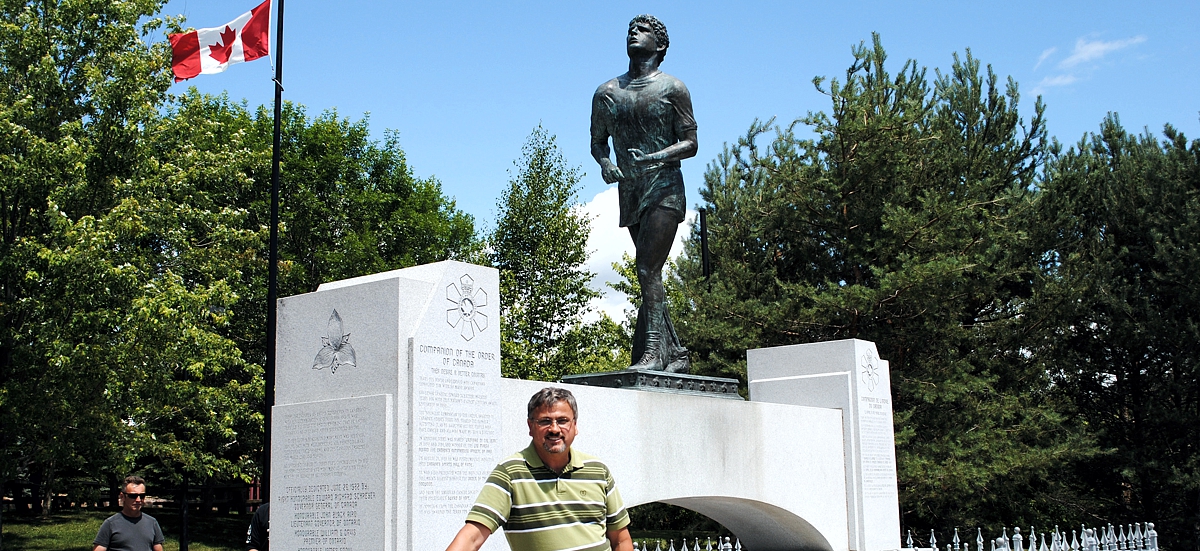Saying no to Terry Fox and Dan Seals
Young principle: now is now, and let the future be what it wilt

The certainty of rigid propriety is remembered as keenly as if it all had occurred only yesterday. A world of absolutes. Nothing could be more clear. With the fervent belief of a new convert, I was more assured of the certainty of the path/calling then — as a cub reporter growing into my fur as a bona fide journalist — than I ever have been since the girth of years began to subtract the number of holes needed to fasten my belt. I merged with the dogma rather than merely grasping it, my reverence for the rules so firm as to be unshakable.
Useful zealotry
Use of the über-clean writing formula espoused by The Canadian Press (and its American counterpart, The Associated Press) was the badge of honor among news writers. Those who did not practice it, even in non-newswriting scenarios, were not only lesser writers but also guilty of betraying their lack of something deeper each time they put sorry pen to unfortunate paper. Likewise, departments in the newsroom, much less departments within the wider organization, were divided along rigid lines: our side sacred, theirs unwashed.
Zealotry is useful, even while being destructive, in planting young idealists firmly on the path that they should take.
I was hired as a sports reporter. I set up shop in that department, to the exclusion of all else. When I some years later found myself being ported over to general news and feature writing, I had the good sense to at least be reticent, for destruction of the existing “self” surely was the exchange for this unknown. (I didn’t have the image then to reference, but what I dreaded becoming was akin to what I have since seen as the plight of one-time “wizened elder” spiritual men now found grinning and dancing shamelessly in some warehouse-cum-church to beats three generations and four philosophical shifts behind them, made even more foolish by their lack of awareness about the distance from their path gradualism has let them travel.) You can see how being asked to pitch in somewhere else in the organization would be perceived by a rules-bound journalistic Pharisee as the equivalent of being asked to breach one’s faith.
Help out with circulation? Huh? Take a story lead from some crime-writing hack who peers at you over his glasses? Think I can’t tell what’s really behind that tip? Hmm? Woe, then, unto the dark forces in the advertising department who would dare approach you with a story idea. The devil’s tricks, like his minions, are legion.
It is against this self-righteous, self-important backdrop I began development as a newspaper man. Fully persuaded. Unshakeable sense of right and wrong. Absolute sense of story. And in cases of error, an equal recognition of the need for absolution.
A breach of faith
I breached my faith once, back in the 1970s, when Prime Minister Trudeau came to town.
Pierre Trudeau. Pierre Elliott Trudeau. Yes, that Trudeau.
Encouraged, I was, by a very kind operative from The Canadian Press, who was using our facilities at the Corner Brook Western Star to post his photo coverage of the prime minister's campaign stop on the national wire. He saw my longing to be in The Presence and how forlorn my lot as a lowly sports puke was apt to leave me on occasions such as these. He got me in to the event under the guise of being his assistant, and these grateful eyes did indeed behold greatness.
I paid penance heartily enough through laborious and dedicated coverage of a not-very-good Corner Brook Royals senior hockey team and other sports staples in the next couple of years — so much so that it got me noticed by other editors, with other goals, and I wound up in charge of sports at the semi-weekly Gander Beacon.
Head of the department, for those who are counting. A place to carve out a legacy.
Until the parent corp bought out a failing St. John’s daily. The event turned out to be an event horizon, drawing as it did our present, and our immediate future too, into the same black hole that had been receiving the doomed publication’s life force all along. And I found myself enlisted to fill a normally farmed-out role in … gag! … circulation — delivering bundles of papers twice a week to retail outlets around town. Ugh!
And then the editor came to me one raw March afternoon with an assignment no self-respecting sports reporter wants to hear. He wanted me to go out on the Trans-Canada Highway and intercept a young man who had taken it upon himself to run across Canada in a fundraising effort for cancer research. Yawn.
Blinded by the right
We chuckled among ourselves about the chances of a British Columbia fellow surviving a run across Newfoundland this stormy time of year, let alone the vastness of Canada ahead of him should he somehow prevail. But it was a story that editor Bob Moss — himself a man who’d traveled for journalism’s cause — wanted in the Beacon anyway.
I didn’t laugh for long, myself. Not much beyond a surly chuckle, and a snort of disdain. This is no legitimate sports story, no matter how you slice it. I was furious about the demeaning treatment I was getting — fully aware that the sensation engulfing me was from an elevator accelerating its descent.
I came within a whisker of being fired when I refused to go. Saved only by the snow storm that closed in, causing the intrepid sojourner and his entourage to pack up and drive right by our area, hoping for a better start tomorrow well to the west of us.
Decisions made by the Terry Fox team notwithstanding, I was prepared to accept firing, if it had come to that. At least I would have left with my pride, and the satisfaction that I had not yielded to unreasonable expectation.
Springing into action
A few short years later I found myself in Uxbridge, Ont. I was a seasoned vet, and fully morphed into a typical newsman, by time I took on editorship of the Times-Journal, the flagship of a stable of eight weeklies.
The Uxbridge waiting for me was a self-contained, self-satisfied mini-society. It wanted for nothing, including people coming in from the outside, taking jobs they were confident a local could be groomed to fill. (I’m not convinced this did not also apply to how they perceived the comings and goings of clergy.) The sentiment went not only through the town but throughout the newspaper’s various departments, as well.
Humiliation occurred, what with the in-house and sometimes public mocking of my place of origin and the implied low expectation of my skill set, not to mention the moronically innocent wondering about whether "they have their own newspapers in New-fuhnd-luhnd." (Sadly, an attitude prevalent in the wider Canadian culture, not just small towns.) Regular reminders by fellow staffers that the organization "will never be able to replace" the editor I had replaced tended to vex the spirit as well. But we got on, for it was not difficult to discern that affront was only occasionally the intent.
In this context I locked horns with the advertising manager, who often felt compelled to school me on what the editorial department used to cover/wants to cover/needs to cover. The self-serving tips that might grease the wheels in his sales endeavors didn’t offend me. Didn’t move me, either — unless, of course, there was a legitimate story to be found in the roughage of such “tips” — but at least in that case I could understand, and in a small way respect, where he was coming from.
One spring day in 1985, he came excitedly pitching a story about a Baha’i gathering in nearby Goodwood. Dan Seals, brother of Jim Seals, would be there. Maybe Jim, too, though that was yet unclear. The artist who came to be known as “England Dan” was prominent enough to get my attention, though the brother who represented half of the Seals and Crofts duo inspired me more. Hummingbirds and jasmine being a fresh breeze on radio airwaves dominated by tales of panting boys and easy women, you know.
I didn't care that Seals and Crofts music promoted a belief system different from the one assigned to me at birth. Still don't. I’m good around people who live their faith. I’m good around artistic people, particularly poets and musicians. I was familiar with the body of work by Seals and Crofts more than the kid brother’s, but intrigued nonetheless. I’d recently had a great all-afternoon interview with Rich Dodson, of 1970s Stampeders fame, at his studio in Toronto. Also with Bill Gaither — a one-on-one interview backstage at Massey Hall. I was certainly in the groove. An opportunity to come away from a sitdown with (preferably Jim) Seals with something meaningful — something that lived a hand’s breadth beyond guitar riffs and chords, melody and lyrical construct — would be a plum assignment any day of the week.
Except it wasn’t an assignment. It was a news tip, sweet and succulent on its own but having wilted under the rancid breath of The Conniving One, even as it was spat from his leering, foul mouth.
I sprang into action immediately. Defender of the Principled Path, you can call me. Enemy of The Enemy. Slayer of interlopers whose unrelenting desires for self-satisfaction would render the Halls of News impotent and tarnished.
I did head out to Goodwood that Friday evening. But as the lovely people of peace began to assemble for their weekend of fellowship and ideas exchange, pondering all the while how to make the world a better place, I pulled out and passed the line of cars slowing to turn off of Highway 47 and to their destination atop a grassy hillside. I continued on, instead, to Toronto, where "important things" were taking place.
Man of principle, I showed 'em. I showed 'em all.


